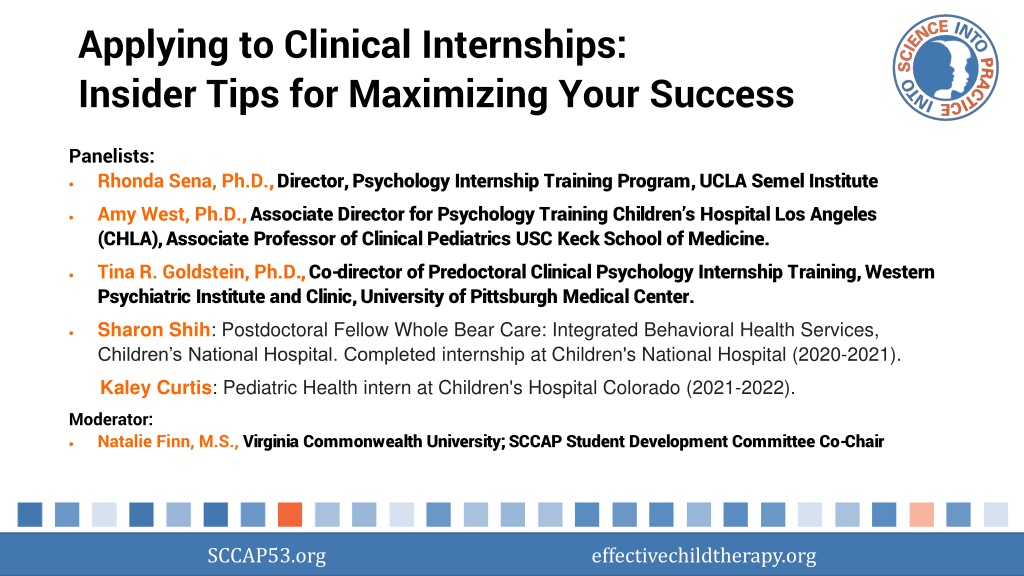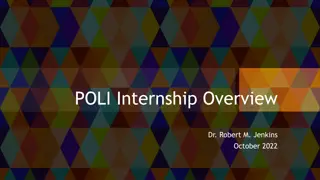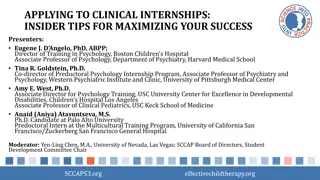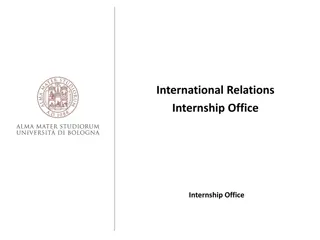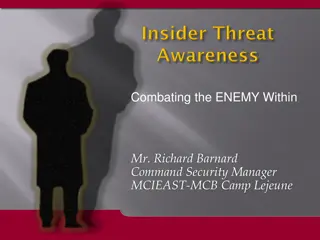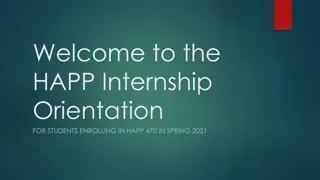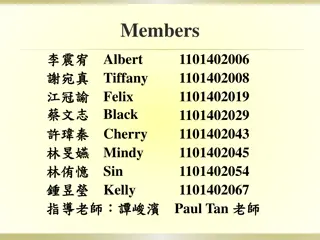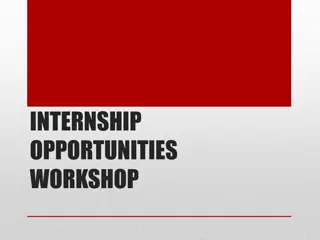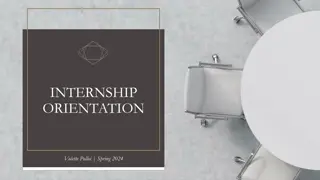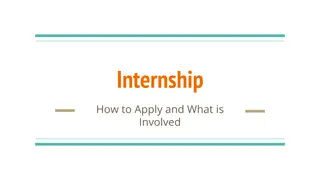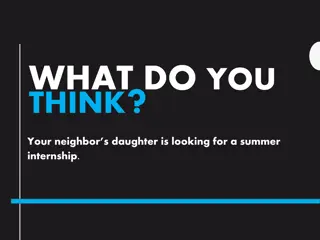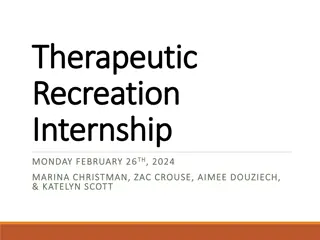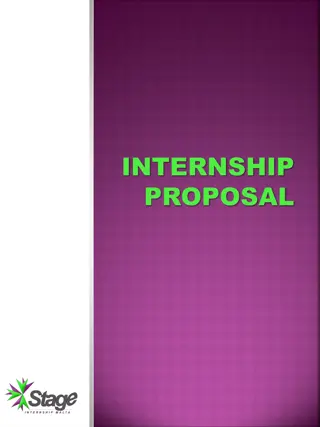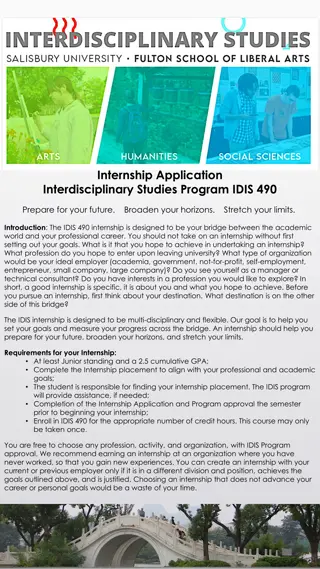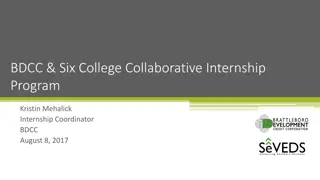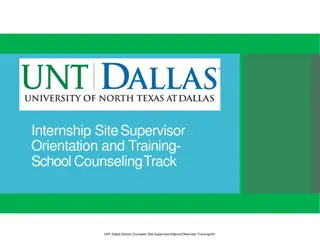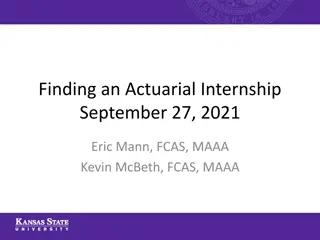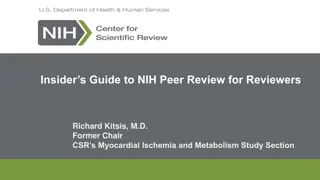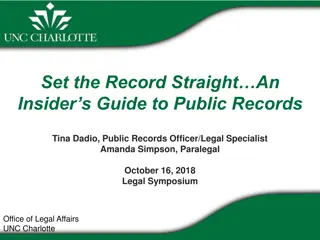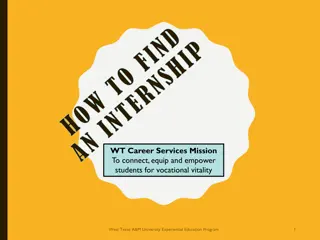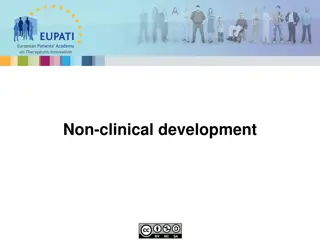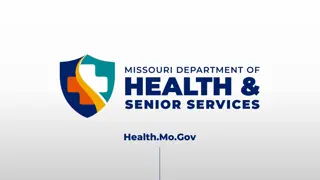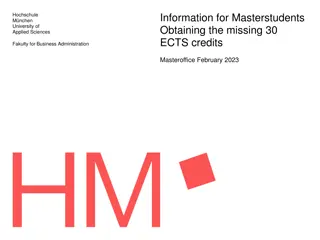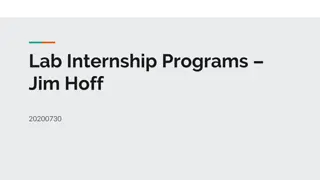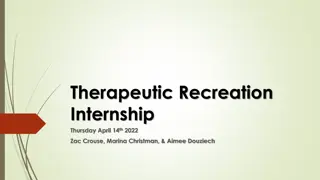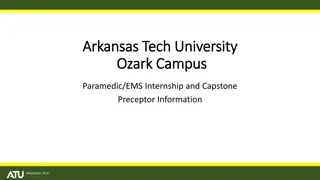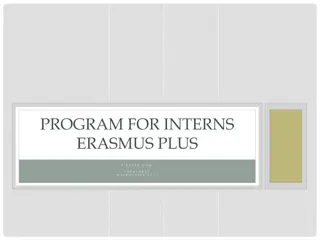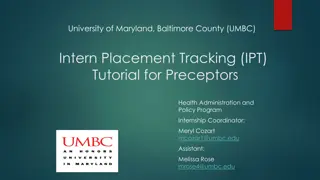Insider Tips for Clinical Internship Success
Gain valuable insights on maximizing success in clinical internships from experienced panelists in the field. Learn about selecting internship sites, applicant statistics, and important factors to consider when choosing a program. Get ready to enhance your internship experience and boost your career prospects!
Download Presentation

Please find below an Image/Link to download the presentation.
The content on the website is provided AS IS for your information and personal use only. It may not be sold, licensed, or shared on other websites without obtaining consent from the author. Download presentation by click this link. If you encounter any issues during the download, it is possible that the publisher has removed the file from their server.
E N D
Presentation Transcript
Applying to Clinical Internships: Insider Tips for Maximizing Your Success Panelists: Rhonda Sena, Ph.D., Director, Psychology Internship Training Program, UCLA Semel Institute Amy West, Ph.D., Associate Director for Psychology Training Children s Hospital Los Angeles (CHLA), Associate Professor of Clinical Pediatrics USC Keck School of Medicine. Tina R. Goldstein, Ph.D., Co-director of Predoctoral Clinical Psychology Internship Training, Western Psychiatric Institute and Clinic, University of Pittsburgh Medical Center. Sharon Shih: Postdoctoral Fellow Whole Bear Care: Integrated Behavioral Health Services, Children s National Hospital. Completed internship at Children's National Hospital (2020-2021). Kaley Curtis: Pediatric Health intern at Children's Hospital Colorado (2021-2022). Moderator: Natalie Finn, M.S., Virginia Commonwealth University; SCCAP Student Development Committee Co-Chair SCCAP53.org effectivechildtherapy.org
Audience Questions and Answers Submit a question during the webinar: Post your questions for the Q&A segment! On right side of screen, click on the Questions tab on the Go-To-Webinar control panel, and submit your questions Continue the conversation after the webinar in the SCCAP53 Listserv Join us on Twitter @SCCAP53 Remember SCCAP student and Post Doc memberships are free. Join Now! SCCAP53.org effectivechildtherapy.org
Selecting Internship Sites Rhonda Sena, Ph.D. Director, Psychology Internship Training Program, UCLA Semel Institute
Phase I : 3,365 applicants matched (85%) 585 applicants did not match (15%) 2021-2022 Match Statistics/ It s very probably going to be more than ok Of those who matched: 44% matched to their first choice 67% matched to one of their top two choices 80% matched to one of their top three choices Phases I and II: 95.9% of applicants matched to an accredited program SCCAP53.org effectivechildtherapy.org
Things to consider when you re looking at programs Description of the program and training experience Specific rotations, experiences, or populations that match your training goals Type of training faculty Size of the internship program (faculty, staff, trainees) Stipends, perks and benefits Application requirements -Minimum intervention and assessment hours -Types of doctoral programs preferred - Types of degrees accepted/preferred SCCAP53.org effectivechildtherapy.org
Fit with an internship site Consider if your experience makes you a good candidate Breadth is important-this is an opportunity to explore SCCAP53.org effectivechildtherapy.org
Fit with an internship site What s important to YOU? Community setting vs hospital- based setting Urban vs rural setting Diversity of faculty, staff, patient population Outpatient vs inpatient setting Exposure to mentors Opportunity to do research Breadth of training vs depth of training SCCAP53.org effectivechildtherapy.org
88% of internship TD respondents indicated that they were very likely or likely to use virtual interviews for recruitment next year (n=397). The effects of the pandemic Most said this was for social justice reasons! Internship TD respondents indicated that the greatest adjustments to minimum requirements were made for the number of face-to-face intervention and assessment hours and the number of integrated reports (n=409). SCCAP53.org effectivechildtherapy.org
Talk it over 01 02 03 04 Discuss your list with your advisor, mentor or Director of Clinical Training and others who care about you Talk with others who have interviewed or interned at the site for their perspective Attend internship discussion groups, get information at conferences Seek honest feedback from trusted people who care about you SCCAP53.org effectivechildtherapy.org
The average number of applications submitted for Phase I was 14.7 (SD=4.8) How many applications should I send? The median number of applications submitted in Phase I was 15 SCCAP53.org effectivechildtherapy.org
Association of Psychology Postdoctoral and Internship Centers (APPIC) https://membership.appic.org/directory/search Clinical Child and Pediatric Psychology Training Council (CCaPPTC) https://www.clinicalchildpsychology.com/ccapptc- member-programs Directories Society of Clinical Child and Adolescent Psychology (SCCAP) https://sccap53.org/resources/student- resources/training-program-database/ Academy of Psychological Clinical Science (APCS) https://www.acadpsychclinicalscience.org/ SCCAP53.org effectivechildtherapy.org
Take in information, reflect . SCCAP53.org effectivechildtherapy.org
and then use your wise mind SCCAP53.org effectivechildtherapy.org
Internship Application Materials Amy E. West, Ph.D. Internship Training Director University of Southern California/Children s Hospital Los Angeles SCCAP53.org effectivechildtherapy.org
Most Important! CV Personal Statement Cover letter SCCAP53.org effectivechildtherapy.org
The Curriculum Vitae SCCAP53.org effectivechildtherapy.org
CV Tips -- Do Tailor it to the type of internship (e.g., clinical vs. clinical science) Describe awards Describe responsibilities for practica and research projects Publications be clear about published vs. in press or under review, and peer review vs. non- peer review PROOF it! (the importance of this cannot be overstated) Make it easy to read and visually appealing Use bolding, caps, font, etc. to make it easy on the eye and highlight important parts. Include spaces! Be concise, consistent with tenses and style, good grammar; use active voice; use psychological jargon cautiously Ask peers and mentors for examples Include volunteer service (will speak to your character) SCCAP53.org effectivechildtherapy.org
CV Tips Dont Don t pad it Don t include courses you took or conferences/workshops attended (with no presentation) Leave off undergraduate accomplishments unless really impressive (Rhodes scholar) Don t get too personal Leave off hobbies, marital status, children, other jobs not relevant to psychology Don t worry about length there are no rules Don t try to be cute or humorous SCCAP53.org effectivechildtherapy.org
Vita Checklist Name and contact information: work, home, address, phone, email Education, including degrees, places, and dates Dissertation topic, advisor Licenses/certifications Honors, scholarships, fellowship, or awards Professional Experience Teaching, research, or clinical experience Publications Professional or academic presentations Professional organization memberships Volunteer/service work SCCAP53.org effectivechildtherapy.org
Personal Statement SCCAP53.org effectivechildtherapy.org
Basic Structure What are your short and long term professional goals? Immediate, 5-10 year and ultimate long term plans? How did these goals develop? Specific or personal challenge? How have you already begun to lay the foundation for these goals? Activities? How does this internship fit into these goals? Skills and knowledge? SCCAP53.org effectivechildtherapy.org
Personal Statement - Do Define a central idea Tell the story (what happened) Tell what you learned (what you got out of it) Tell how what you learned applies to success in [the internship] (why it matters) Highlight your strong points; include interests and goals Be truthful Write from the heart Be positive but avoid excessively altruistic statements (e.g., I just want to help people. ). SCCAP53.org effectivechildtherapy.org
Personal Statement Dont Quote other people Use clich s Use altiloquent vocabulary Negative comments and excuses Be too candid. For example, avoid references to your mental health. Avoid providing excessively self-revealing information Use inappropriate humor, attempts to appear cute or clever, and references to religious issues or politics Adapted from: http://users.clas.ufl.edu/msscha/psych/personal_statement.html https://psych.iupui.edu/sites/default/files/guidetowritingapersonalstatement_1.pdf SCCAP53.org effectivechildtherapy.org
Cover Letter SCCAP53.org effectivechildtherapy.org
Basics Cover letters are 1-2 page documents Introduce yourself to the program director Argue why you would be a good fit for the internship Fill in places your curriculum vitae cannot describe Further explain other aspects of your curriculum vitae APA emphasizes that you should: Show you are a good fit Get past the gatekeepers Customize Mind the details Don't get too personal SCCAP53.org effectivechildtherapy.org
Cover letter Structure Opening paragraph: Clearly state why you are writing. Give a brief introduction of yourself and your status, e.g. I am completing my PhD in [department or field] and I expect to finish [or defend, or graduate] in [Month, Year]. You could add to this sentence, the name of your dissertation or the topic of your research, as well as the name of your advisor. Middle paragraphs: You should have several paragraphs that elaborate on how your research and other experiences in graduate school that have prepared you for the internship as it is described. Describe how your research and clinical activities have led you here. In order to stand out from the potentially long list of applicants, you will need to make a coherent argument for why you are a good fit. What kind of contribution will you make to their program? How will you fit in? Make sure you are writing for your target audience. Closing paragraph: Indicate that your CV and other supporting documentation are enclosed. Express interest in speaking with the addressee further in a personal interview. Thank them for their time and consideration. SCCAP53.org effectivechildtherapy.org
Cover Letter -- Do Address the specific internship materials Speak to the specific needs of the organization Highlight key words from the materials Show your passion Keep the letter concise Focus on demonstrating match Thank your reader Proofread! SCCAP53.org effectivechildtherapy.org
Cover letter Dont Reiterate your curriculum vitae Have a boring opening statement Ramble Use jargon Underestimate the importance of a good cover letter SCCAP53.org effectivechildtherapy.org
Interviewing for Internship Tina Goldstein PhD Co-Director, Predoctoral Psychology Internship Program Western Psychiatric Hospital, University of Pittsburgh Medical Center SSCAP Internship Webinar July 29, 2021 Western Psychiatric Hospital
Its all about the FIT! What kind of career is this site preparing interns for? How does the site fit with your own career goals? Consider the environmental culture and the individuals you meet
The Interview: Basics Be yourself Stay calm Present yourself professionally Convey (genuine) enthusiasm We want to know you! The best interviews are conversations ( and don t forget that they re still interviews) Practice! (really, practice)
The Interview: Tips for Preparing Do your homework! Know the site tracks rotations size sites requirements timeframe Ask informed questions (come prepared with questions ) Take notes afterward Thank you notes / emails
The Interview: Commonly Asked Questions General Why are you interested in this site? What can you bring to this internship? What are your long-term career goals? Where do you see yourself in 2/5/10 years post-internship? Clinical Describe a recent clinical case that went well. Describe a clinical case that presented a challenge for you. What have you done in your training to further your knowledge about diversity, equity and inclusion? Research Tell me about your dissertation. Where does research fit into your career aspirations? Who would you be interested in working on research here?
Questions for Current Interns at the Site What is a typical work day like? What are the expectations for billable/supervision hours? How does your experience match with what you expected? What is your experience with faculty/supervisors/trainees? What are the program's strengths and weaknesses? To what extent do you feel supported? How does the program approach cultural humility training? What is it like living in [CITY]?
Thank you! I welcome your questions
Applying for Internships: The Student Perspective Kaley Curtis Graduate Institution: University of California, Berkeley Predoctoral Internship: Children s Hospital Colorado Sharon Shih, MA Graduate Institution: Georgia State University Predoctoral Internship: Children s National Hospital Postdoctoral Fellowship: Whole Bear Care: Integrated Behavioral Health Services, Children s National Hospital SCCAP53.org effectivechildtherapy.org
Our Backgrounds Kaley Applied to internship: Fall 2020 (during Covid) Practicums: Peds psych & neuropsych in a children s hospital Types of programs applied to: Academic medical settings (pediatric psychology, health psychology) Wants: Pain focus, diverse patients, opportunities to develop Spanish Sharon Applied to internship: Fall 2019 (pre-Covid) Practicums: Peds psych & neuropsych in a children s hospital Types of programs applied to: Academic medical settings (pediatric psychology, integrated primary care rotation available, research possible but not necessary) Wants: Diverse patient population, Central or Eastern time zone SCCAP53.org effectivechildtherapy.org
Big Picture 1. Fit is real, and it is important! 2. Take care of yourself 3. It s only one year . And 4. This is just as much an opportunity for them to get to know you as it is for you to get to know them 5. Phase II is not the end of the world SCCAP53.org effectivechildtherapy.org
Application Tips Task List Create an APPIC account Register for the Match Sign up for the APPIC Intern Network listserv Set Training Goals (and revise) Make a list of sites Ask letter writers Check hours Request transcripts Write essays Write cover letters Update CV Gather supplemental materials Have others review your essays, cover letters, CV Submit! SCCAP53.org effectivechildtherapy.org
Training Goals & Site List Start thinking about your training goals now (these will go in your cover letters and be key in your interviews) E.g., Delivering and disseminating evidence-based interventions for children in medical settings; Ensuring that treatments are responsive to the cultural backgrounds and individual experiences of patients and their families Read brochures of training sites & use their offerings to tweak your goals (this is an iterative process) Another way to think about training goals: training you need now to be the clinician/researcher you want to be in 5 years Use a variety of search terms on the AAPIC directory so you can funnel your search starting wide, then narrow Can also look at site lists gathered by professional organizations SCCAP53.org effectivechildtherapy.org
Letter Writers, Hours, & Transcripts Letter Writers Ask early Ask what information they need from you and by when Site list with deadlines, CV, cover letter, essays, copy of past evaluations Use the standard reference form as a guide for the type of information they might need (e.g., overview of work together, internship and professional goals, areas of growth, strengths to highlight at writer s discretion) Try to send the APPI requests in batches Hours Make sure the way you tracked your hours align with the APPI categories and give yourself time to complete the APPI Transcripts Double check that your grades and status are entered in accurately Request early SCCAP53.org effectivechildtherapy.org
Essays, Cover Letters CV Essays and cover letters require a lot of drafts. Tailor essays to sites. Choose a few folks to trust as readers. You can get conflicting and confusing advice with too many people weighing in/taking charge Some people to consider as readers: Fairly recent internship applicants (they are closer to the process) A non-psych expert (e.g., partner, strong writer). They can provide advice on persuasive writing, while not getting bogged down in the psychology aspect. Have a template for cover letters so you can consistently include some important information about you (e.g., background, training goals), while tailoring the letter to how the site s offerings fit with your background and goals Update your CV! SCCAP53.org effectivechildtherapy.org
Getting Feedback & Supplemental Materials Getting feedback on your essays Identify 3-5 individuals to review your essays Aim for individuals that would each provide a unique perspective Give your readers time to review and provide feedback Getting feedback on your cover letter and CV Identify 2-3 individuals to review a cover letter (template or top sites) Identify 1-2 individuals to review your CV Supplemental Materials Types: Treatment summary, Assessment report, Integrated report Chose cases that most align with your training goals and the site Make sure you have access to reports you plan to include in your application De-identify SCCAP53.org effectivechildtherapy.org
Interview Tips - Scheduling Create a Calendar with all possible interview dates Check email regularly (create email response template) and have phone handy for interview offers Schedule strategically Interview in December if possible If in-person: Leave minimum one day between trips to account for weather, if possible Spend time in the region and get to know your location, if possible Consider getting TSA pre-check Pack in a carry-on Consider an airline credit card with a points deal SCCAP53.org effectivechildtherapy.org
Interview Tips Practice! Solidify your elevator pitch introduction What are the top 5 things you want to make sure the site knows about you? Practice with a variety of individuals Use your cover letter as your study guide and make a list of quick facts from the brochure to review before. Take advantage of the site overview presentation at the beginning of the interview day. Prepare for both structured and unstructured interviews Have generic and site-specific questions to ask Some sites have a social so be prepared for more informal interactions Some sites are known for case studies so be aware SCCAP53.org effectivechildtherapy.org
Interview Tips Take advantage of time with current interns Ask about: Hours, Telehealth options, Day-to-day schedules Support for professional development Cost of living, the location What they wish they had known Get their email addresses for follow-up Qs Talk with other interviewees these will be your colleagues and potentially co-interns! Send thank you emails, as appropriate Take detailed notes after interviewing at each site, or audio record your thoughts when you have a fresh impression Give your sites numerical rankings based on your own categories Rank with your gut SCCAP53.org effectivechildtherapy.org
COVID Considerations A lot of interviews may be virtual, prepare for both options If you can/ feel comfortable visit the site in person Get a sense of what it was like for the current interns Did they do telehealth? Were they able to get their hours? Leave policies? Take COVID into account at all steps SCCAP53.org effectivechildtherapy.org
Resource list: Internships in Psychology - Amazon Link SCCAP53.org effectivechildtherapy.org
Questions? Still have questions? Please post them on the SCCAP Listserv to continue the community discussion div53@lists.apa.org SCCAP53.org effectivechildtherapy.org
